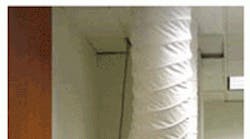Where do building managers go, when the cold winds blow, and their building is without heat? Let's hope it's to an HVAC contractor with the resources to provide temporary heat during the repair.
The need for temporary heat during forced air system failures or during maintenance that requires a shut down, must be met quickly. Employee comfort and efficiency plummets in a cold office almost as fast as the mercury falls. In a public setting, such as a retail outlet, customers will stay away, or the store will remain closed until the repair's complete. Most importantly, there's the danger of bursting water lines in the coldest climates.
As with leased portable cooling units (see "Cool & Quick: Emergency Cooling"), portable heating units are compact, powerful, and easy to maneuver. In fact, they're often the very same unit a contractor will lease for temporary cooling during an air conditioning failure, in the heat pump mode.
"They're not bulky or big, and they use the same ceiling kit, which, when it's in the heat pump mode, ducts cool air into the ceiling," explains Garth Tagge, national sales manager, Spot Coolers, Norcross, GA. Spot Coolers is a preferred national distributor of Denso MovinCool® portable cooling products and heat pump air conditioners.
"The heating units' power supply is identical, and the heat pump provides almost the same BTUH capacity in the heating mode as it does in the cooling mode. A one-ton cooling unit provides about one-ton of heating," Tagge says.
Ambient Heat Factor
While temporary heating units are problem solvers for commercial applications, they’re not practical in larger industrial locations. For example, you wouldn't try to use one to heat a warehouse at 10F, because a heat pump becomes ineffective below 55F.
"The most common application is in a hospital, office building, institutional, or commercial building that's lost some or all of its heat. And since occupied commercial buildings have an internal heat load — through lights, activity, and heat generated from computers and other office equipment — the ambient won't drop significantly into the 50F range," Tagge explains. "As the heat pump raises the temperature, it gets warmer at a faster rate of speed. If more heat is present in the environment, the portable unit will, in turn, generate more heat."
Modern portable heating units are safe, efficient, quiet, and emission-free. Those features are essential if a unit is being used to heat a work space or retail area that serves the public.
"Any contractor who finds he must respond to a no-heat call, and provide supplemental heating during the repair, will have access to our most up-to-date models," Tagge says.
Spot Cooler portable heat pump air conditioner distributors can be found by visiting spot-coolers.com.
"At temperatures between 45F to 55F, portable heat pumps are excellent for supplemental heating; they provide a quick and efficient way to deliver spot heating to chilly lobbies, public spaces, or areas where there has been a partial shutdown of the primary heating system," says Clark Michel, vice president, Atlas Sales & Rentals, Inc., based in Newark, CA.
For emergency heating in very cold environments, Michel says indirect fired heaters are ideal. These contain a heat exchanger which encloses a natural or propane gas or kerosene heating source, and blows air into the building or space to be heated. The result, says Michel, is warm, dry, emissions-free air that's safe for occupants.
"Additionally, large, electric heaters that use resistive heating also provide clean, dry air with no emissions. However, they consume large amounts of electricity, and often require high voltage wiring (220V or 460V), so they're a less practical option than indirect fired heaters," Michel says.
Visit atlassales.com for product information.








